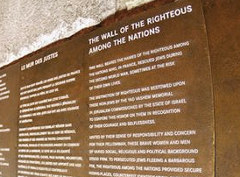Jethro and Melchizadek: Two Righteous Gentiles

Yad Vashem Holocaust Memorial in Jerusalem not only remembers those who died in Europe during that awful period from 1933-45, it also honors non-Jews who protected and rescued their Jewish neighbors from death. They are memorialized on the Avenue of the Righteous Gentiles.
In Exodus 17 and 18 I have pondered how the Amalekites, history’s “first terrorists” (17), contrasted so sharply with the Midianites (18) in the ways the two “Gentile” peoples related to Israel after they departed from Egypt. The Amalekites were descendants of Abraham through Esau who viciously attacked Israel (Exo.17:8-16) by killing the stragglers at the rear of the Israelite column (Deut. 25:17-19). In both of these passages God promised eternal vengeance on this people who never ceased in their hatred for Israel until they were finally eliminated in the days of Esther and Mordecai (Esther 3:1; 7:10; 9:14).
The Midianites, however, were descendants of Abraham through Keturah who greeted peacefully the Israelites in the person of their priest, Jethro (Exo. 18:1-12). The father-in-law of Moses is one paradigm of the righteous Gentile who provides for Israel rather than attacks them. While Jethro is best known for his sage counsel to Moses to recruit a team who could help him in his excessive labors (Exo. 18:13-27), there are also some interesting parallels with an earlier righteous Gentile named Melchizedek. Note some of these amazing points of comparison between the two, first suggested to me by John Sailhamer.
Just as Melchizedek priest of Salem met Abraham with gifts as he returned from battle with Amraphel (Gen. 14:18-20) so Jethro the priest of Midian came out with Moses’ family as he returned from battle with the Amalekites (Exo. 18:2-4). While in Gen. 15:2 the servant of Abraham was named Eliezer, the son of Moses is Eliezer in Exo. 18:4. Just as Melchizedek praised God for His rescue of Abraham from his enemies, Jethro also praised God for Israel’s rescue from their enemies (Exo. 18:9-11). Just as Melchizedek brought out bread and wine as a priest of God, so Jethro brought out an offering and sacrifices as a priest of God and ate bread with Moses (Exo. 18:12).
Jethro appears as another Melchizedek, and thus is a second paradigm of the righteous Gentile. It is important that Jethro have such credentials because he plays a major role in Exodus 18, instructing Moses on how to carry out God’s law. Thus, just as Abraham was met by a priest in Genesis 14 before God made a covenant with him in Genesis 15, so Moses is met by Jethro the priest in Exodus 18 before God makes a covenant with him at Sinai in Exodus 19.
The last point to notice is that the “Big Story” is also operative in these “stories.” Abraham was promised by God that whoever among the goyim would bless Abraham would be blessed and whoever cursed him would be cursed (Gen.12:3). Melchizedek and Jethro blessed Abraham and were blessed. The Amalekites cursed Abraham in his descendants—and were then themselves cursed!
We rightly take notice of intertextual links between NT and OT passages, but such intertextual links between OT passages should also be noted. Are these just coincidences or are they part of a compositional strategy? The way in which they reflect the “blessing and curse” dynamic of the Abrahamic promise argues that the similarities are more than coincidences.
Will Varner Bio
Will Varner is Professor of Bible & Greek at The Master’s College. He earned a BA from Bob Jones University, MA from Dropsie College, MDiv and ThM from Biblical Theological Seminary and EdD fromTemple University. He blogs at DrIBEX Ideas.
- 925 views


Discussion